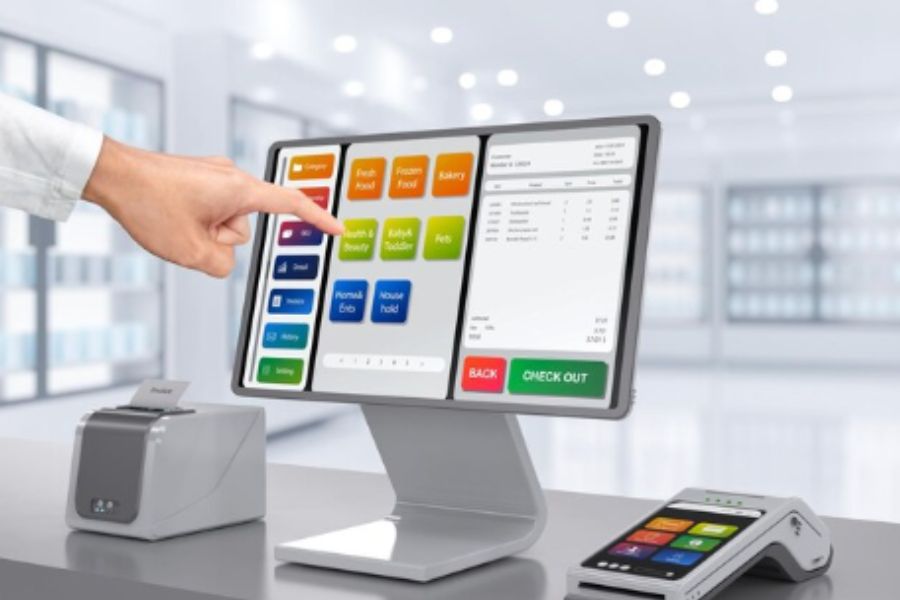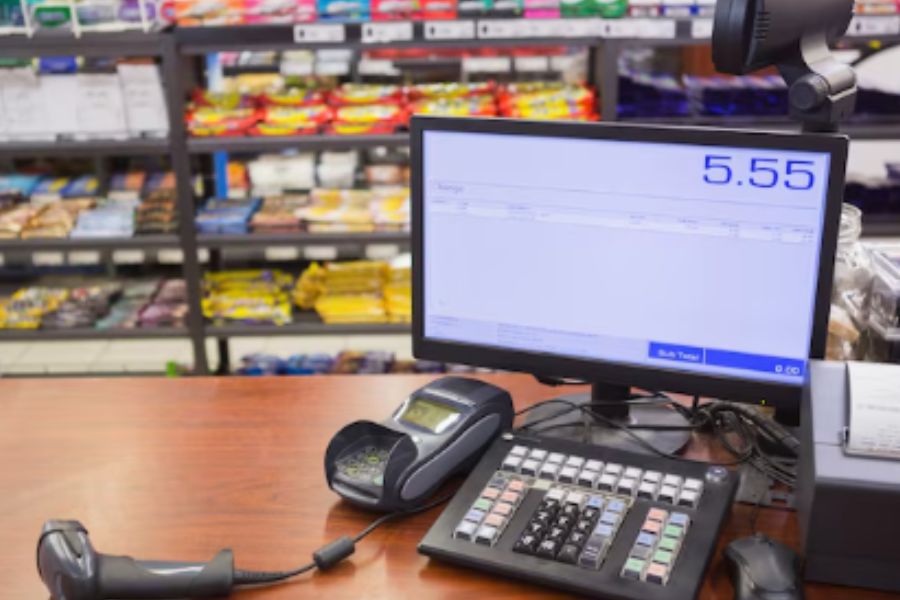The point-of-sale (POS) system is one of the tools that can’t be lacking in the retail industry. It has undergone a remarkable transformation, evolving from traditional analog methods to highly sophisticated automated systems. This evolution has not only streamlined checkout processes but has also revolutionized inventory management and customer service.
In this article, let’s explore the historical journey from analog to automated point of sale in supermarket and highlight the myriad benefits of modern POS solutions.
What is the Point of Sale in Supermarket?
A point of sale in supermarket refers to the hardware and software combination used for completing sales transactions. It is the place where a customer makes a payment for products or services at a retail store. The POS system in a supermarket is designed to streamline various aspects of the retail process, including sales, inventory management, and customer service.
Key features of a point of sale in supermarket include:
- Transaction processing: The primary function of a supermarket POS system is to process sales transactions efficiently. It includes scanning barcodes or manually entering product codes, calculating the total amount, applying discounts or promotions, and handling various payment methods such as cash, credit cards, or digital wallets.
- Inventory management: Supermarkets deal with a large number of products and need to manage their inventory effectively. A POS system helps track the number of products sold, update inventory levels in real time, and generate reports on stock movement. This aids in avoiding stockouts, overstock situations, and theft.
- Barcode scanning: Supermarkets typically use barcode scanners to quickly and accurately register products during the checkout process. Each product is assigned a unique barcode that contains information such as the product code, price, and other details. Scanning these barcodes speeds up the checkout process and reduces the chances of errors.
- Receipt generation: The POS system generates detailed receipts for customers, providing information about the items purchased, their prices, any discounts applied, and the total amount paid. Receipts are crucial for customers to keep track of their purchases and for returns or exchanges.
- Customer loyalty programs: Some POS systems in supermarkets support customer loyalty programs. These programs involve offering discounts, rewards, or points to customers based on their purchases. The POS system helps track and manage these loyalty programs, encouraging repeat business.
- Employee management: POS systems in supermarkets often have features for employee management, including tracking employee sales, managing access levels, and monitoring employee performance.
- Reporting and analytics: Supermarkets can use POS systems to generate various reports and analytics, such as sales trends, top-selling products, and customer behavior. These insights can be valuable for making informed business decisions.
Evolution of Electronic POS Systems from Analog to Automated
The journey of point-of-sale systems from analog to automated has been nothing short of revolutionary. The transition reflects a constant pursuit of efficiency, accuracy, and enhanced customer experiences. Let’s discover the evolution of point of sale:
The Age of Analog: Traditional Cash Registers
In the not-so-distant past, the backbone of retail transactions was the traditional cash register. These mechanical devices, often accompanied by a satisfying “ka-ching” sound, were the workhorses of countless businesses. While they served the purpose of recording sales, their functionality was limited to basic arithmetic and lacked the sophisticated features we take for granted today.
As businesses expanded and diversified, the limitations of analog cash registers became apparent. Managing inventory, tracking sales trends, and adapting to dynamic market demands required a more advanced solution.
The Emergence of Electronic POS Systems
The dawn of electronic POS systems marked a pivotal moment in the retail industry. With the integration of microprocessors and electronic displays, these systems offered businesses unprecedented capabilities. Inventory management became more streamlined, and the potential for detailed sales reporting opened new avenues for strategic decision-making.
Electronic POS systems allowed for the customization of receipts, the introduction of barcode scanners, and the ability to process various payment methods.
This flexibility not only improved operational efficiency but also enhanced the overall customer experience. The transition to electronic POS systems laid the foundation for the digital transformation that was yet to unfold.
Cloud-Based POS Systems
The advent of cloud technology brought another wave of innovation to the realm of POS systems. Cloud-based POS systems took the capabilities of electronic systems to new heights by leveraging the power of remote servers and real-time data synchronization.
Unlike their predecessors, cloud-based POS systems enable businesses to access critical data from anywhere with an internet connection. This not only facilitates centralized management of multiple locations but also enhances security and reduces the risk of data loss. Moreover, these systems often come with advanced analytics tools, empowering businesses to make data-driven decisions and adapt swiftly to market changes.
The transition to the cloud also paved the way for improved customer interactions. Loyalty programs, personalized promotions, and seamless integration with online platforms became integral parts of the retail experience. The flexibility of cloud-based POS systems not only benefits large enterprises but also caters to the needs of small and medium-sized businesses, fostering a more inclusive and competitive market.
Future of POS
Looking ahead, the future of POS systems promises even greater advancements. The integration of artificial intelligence (AI) and machine learning (ML) is expected to revolutionize the way businesses interact with their customers. Predictive analytics, automated inventory management, and personalized recommendations are just a glimpse of what the future holds.
Mobile POS solutions are also gaining prominence, allowing businesses to go beyond traditional checkout counters. Whether in a brick-and-mortar store or at an outdoor event, the ability to conduct transactions on mobile devices enhances flexibility and improves customer engagement.
Benefits of Using the Point of Sale in Supermarket Today
Nowadays, many people love using the point of sale in supermarkets because it brings them many benefits, like:
Managing Inventory Efficiently
One of the pivotal advantages of implementing a POS system in a supermarket is the efficient management of inventory. Traditional inventory tracking methods often fall short in coping with the complexities of a modern supermarket’s diverse product range.
POS systems, equipped with advanced features, automate inventory management, ensuring real-time updates on stock levels, expirations, and sales trends. This not only minimizes the risk of overstocking or stockouts but also enables precise reorder planning, optimizing the supermarket’s supply chain.
ConnectPOS is one of the POS solutions that have robust inventory management features in supermarkets by providing real-time tracking and automated updates. With shelves constantly in flux due to customer purchases, accurate tracking is essential to prevent overstocking or stockouts. ConnectPOS ensures that supermarket staff can monitor stock levels seamlessly, leading to optimized inventory turnover and a reduction in potential losses due to mismanagement.
Easy Invoicing
Invoicing is a fundamental aspect of supermarket operations, and a POS system simplifies this process significantly. Automated invoicing reduces the likelihood of errors and accelerates the checkout process. The system can generate detailed and accurate invoices for every transaction, providing a seamless experience for both customers and staff.
Additionally, the integration of barcodes and scanning technology streamlines the checkout process, making it more convenient for shoppers while enhancing the supermarket’s overall operational efficiency.
ConnectPOS can simplify this intricate task, offering an intuitive interface that enables staff to generate invoices quickly and accurately. The system’s integration with the supermarket’s product database ensures that prices are always up-to-date, minimizing the chances of errors. This not only expedites the checkout process but also enhances customer satisfaction by providing a seamless and reliable transaction experience.
Quick Payments
Speed is of the essence in today’s fast-paced retail environment, and POS systems excel in facilitating swift and secure payment transactions. Integrated with various payment options, including credit/debit cards, mobile wallets, and contactless payments, POS systems cater to the diverse preferences of customers. Faster transactions not only reduce waiting times for customers but also contribute to increased customer satisfaction.
Moreover, secure payment processing helps build trust, fostering a positive shopping experience that encourages repeat business.
You can integrate ConnectPOS to get various payment methods, including credit cards, mobile wallets, and contactless payments, ensuring that customers can choose their preferred mode of transaction. This versatility not only caters to diverse customer preferences but also contributes to shorter queues at the checkout counters.
Improving Customer Management
A point of sale in supermarket extends beyond transactional functionality to enhance customer management. It allows supermarkets to create and manage customer profiles, track purchase histories, and implement loyalty programs seamlessly.
By understanding customer preferences and behaviors, supermarkets can tailor promotions and discounts, fostering customer loyalty and increasing the likelihood of repeat business. The integration of customer relationship management (CRM) features in POS systems empowers supermarkets to build stronger connections with their clientele.
ConnectPOS plays a pivotal role in improving customer management within supermarkets. The system allows for the creation of comprehensive customer profiles, capturing data such as purchase history, preferences, and contact information. This wealth of information empowers supermarkets to implement targeted marketing strategies, personalized promotions, and loyalty programs.
24/7 Data Access
The digital era demands accessibility, and POS systems deliver by providing 24/7 access to critical business data. Supermarket owners and managers can remotely monitor sales, inventory levels, and other key performance indicators from any location.
This real-time data access enables informed decision-making, as stakeholders can respond promptly to market trends, adjust pricing strategies, and address inventory challenges. The ability to stay connected with the supermarket’s operations around the clock is a valuable asset in today’s competitive retail landscape.
ConnectPOS goes beyond traditional POS systems by offering the convenience of accessing critical business data 24/7. The cloud-based architecture of ConnectPOS ensures that managers and decision-makers can access real-time data from anywhere with an internet connection. This accessibility proves invaluable in a fast-paced industry where quick decisions are essential.
Simplification of Operations
POS systems act as a central hub for various supermarket operations, simplifying complex processes and promoting efficiency. From employee management to sales reporting, these systems automate tasks, minimizing manual errors and freeing up valuable time for staff to focus on customer service.
Integration with other business solutions, such as accounting software and analytics tools, further streamlines overall operations. This level of automation contributes to cost savings, improved accuracy, and a more agile response to market dynamics.
ConnectPOS is not just a transactional tool but a comprehensive solution for simplifying overall supermarket operations. From employee management to seamless integration with other business systems, ConnectPOS streamlines various facets of supermarket operations. The system’s user-friendly interface ensures that staff can quickly adapt to its functionalities, minimizing training time and reducing the likelihood of errors.
FAQs: Point of Sale in Supermarkets
What Prompted the Shift from Analog to Automated POS Systems?
The need for increased efficiency, accuracy, and advanced functionalities prompted the shift from analog to automated POS systems. Modern supermarkets POS face complex challenges that traditional cash registers could no longer address adequately.
How Do Modern POS Systems Differ from Traditional Cash Registers?
Modern POS systems, such as ConnectPOS, differ from traditional cash registers by offering advanced features like inventory tracking, real-time data accessibility, and integrated payment solutions. They are designed to meet the diverse needs of contemporary supermarkets.
How Do POS Systems Contribute to Efficient Checkout Processes?
POS systems contribute to efficient checkout processes by automating tasks, such as calculating totals, processing payments, and updating inventory in real time. This results in quicker transactions, reducing wait times for customers.
Can POS Systems Prevent Inventory-Related Issues Like Stockouts?
Yes, POS systems, especially those like ConnectPOS, can prevent inventory-related issues like stockouts. By providing real-time updates on stock levels, supermarkets can proactively manage inventory, ensuring products are consistently available to customers.
Conclusion
The evolution of the point of sale in supermarket, from analog to automated systems, has been transformative. Modern POS solutions, exemplified by ConnectPOS, not only streamline transactions but also revolutionize inventory management and customer service. As supermarkets continue to embrace technology, the future promises even more innovative and efficient POS systems, shaping the retail experience for both businesses and consumers. Embracing these advancements is not just a matter of staying current; it’s a strategic move toward ensuring the sustained success of supermarkets in the ever-evolving retail landscape. Get in touch with us to understand more about POS for your business.



